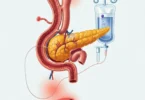The most informative method for diagnosis colon cancer is the colonoscopy. The intestine is examined with a tubular instrument that is equipped with a camera and a light source (endoscope). The intestinal walls can thus be illuminated and judged on a monitor. During the investigation, polyps that may develop within a few years to cancer can be removed with a sling. A tissue samples is taken from cancer suspect areas ( biopsy ) and then examined under the microscope. It should always be examined the entire colon. Then by histological examination of the tissue samples, colorectal cancer can be reliably detected or excluded.
Colonoscopy is usually performed under light anesthesia. It is a safe routine procedure. The complication rate is extremely low. Before diagnosis the patient must defecate thoroughly, usually by drinking large quantities of liquid while dispensing simultaneously with food.
Capsule Endoscopy
As an alternative to normal colonoscopy, capsule endoscopy and virtual colonoscopy have been developed in recent years. In the capsule endoscopy, the patient swallows a small capsule in which a tiny camera is included. The camera passes through the gastrointestinal tract and thereby continuously takes on pictures it sends to a receiver that the patient always wears during the investigation with him. The capsule is excreted in the feces and then has no function. So you do not need to be “saved”.
The doctor can view the images from the capsule camera and judge conspicuous sites in the intestines on the computer. Capsule endoscopy is especially useful in diseases of the small intestine because small intestine cannot be seen with normal colonoscopy usually. For examination of the colon, colonoscopy is considered more accurate.
Virtual colonoscopy
In virtual colonoscopy, a computed tomography (CT) or magnetic resonance imaging (MRI) is made. From the images, a computer can calculate a three-dimensional image of the colon and represented graphically. Thus, the intestinal wall can be reliably assessed; the patient needs to defecate with laxatives completely, just like a regular colonoscopy.
With Capsule endoscopy and virtual colonoscopy some patients feel possibly more comfortable. However, these new methods have several disadvantages compared to normal colonoscopy: First, they are not as accurate as the normal colonoscopy, especially in the detection of small changes. Second, polyps that are discovered during the investigation, not be taken or immediately be removed and examined histological as in colonoscopy. Third, the two methods are currently usually not covered by statutory health insurance (an assumption of costs for hospital care may be possible).
For more general information…..






